|
|
|
Sort Order |
|
|
|
Items / Page
|
|
|
|
|
|
|
| Srl | Item |
| 1 |
ID:
152322
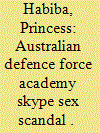

|
|
|
|
|
| Summary/Abstract |
In 2011, the Australian Defence Force Academy became embroiled in a sex scandal when a cadet made public, claims of abuse. Her claims led to a number of inquiries, which unveiled many other historical abuse claims. As such, this case revealed some of the potential problems associated with the containment of such disputes. To explore this further, a brief review of workplace changes (1930–present) was conducted, which highlighted the development of current containment measures. This was followed by a two-pronged case analysis of the 2011 Australian Defence Force Academy Skype sex scandal. Boltanski’s process theory was used in conjunction with Bourdieu’s field theory to study the containment of the case. Combined, these analyses revealed that, while a focus on the central players and their relations as psychologized/personal is a main strategy for containment, this approach can deflect attention from other factors that play important roles, resulting in more significant, far-reaching problems.
|
|
|
|
|
|
|
|
|
|
|
|
|
|
|
|
| 2 |
ID:
150133


|
|
|
| 3 |
ID:
177670


|
|
|
|
|
| Summary/Abstract |
This article explores the Taliban’s insurgency (2007–9) in Swat valley (Pakistan), with two objectives: (a) how civilians survive violence and (b) what their survival strategies mean for them. Drawing on in-depth interviews and focus group discussions, conducted in 2016 to 2019, it offers a typology of civilians’ survival strategies which includes resistance, accommodation, readjustment and withdrawal. It finds that although the strategies worked, resistance and accommodation have had a detrimental impact on civilians in the form of direct violence. In comparison, readjustment and withdrawal helped them avoiding direct violence but have had a negative impact on civilian life and society.
|
|
|
|
|
|
|
|
|
|
|
|
|
|
|
|
| 4 |
ID:
141260


|
|
|
|
|
| Summary/Abstract |
The social, economic, and environmental costs of feeding a burgeoning and increasingly affluent human population will depend, in part, on how we increase crop production on under-yielding agricultural landscapes, and by how much. Such areas have a “yield gap” between the crop yields they achieve and the crop yields that could be achieved under more intensive management. Crop yield gaps have received increased attention in recent years due to concerns over land scarcity, stagnating crop yield trends in some important agricultural areas, and large projected increases in food demand. Recent analyses of global data sets and results from field trials have improved our understanding of where yield gaps exist and their potential contribution to increasing the food supply. Achieving yield gap closure is a complex task: while agronomic approaches to closing yield gaps are generally well-known, a variety of social, political, and economic factors allow them to persist. The degree to which closing yield gaps will lead to greater food security and environmental benefits remains unclear, and will be strongly influenced by the particular strategies adopted.
|
|
|
|
|
|
|
|
|
|
|
|
|
|
|
|
| 5 |
ID:
138724
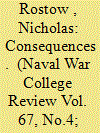

|
|
|
|
|
| Summary/Abstract |
This article examines possible consequences of U.S. and NATO withdrawal from Afghanistan, Russian annexation of Crimea and claims to territory inhabited by ethnic Russian citizens of other countries, and Chinese claims to control large adjacent areas of the Pacific Ocean. Fundamental principles of world public order are at risk or directly challenged in Afghanistan, Ukraine, and the western Pacific. They are not unique locations in this respect, but this article is not a review of all aspects of U.S. diplomacy and policy or of international relations since the end of the Cold War.
|
|
|
|
|
|
|
|
|
|
|
|
|
|
|
|
| 6 |
ID:
139024
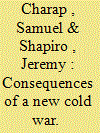

|
|
|
|
|
| Summary/Abstract |
The Ukraine crisis poses vexing policy challenges for Washington. President Barack Obama has sought to strike a balance between the imperative of responding to Russian actions and the equally important need to avoid an all-out confrontation with Moscow. As he put it in July 2014, ‘it’s not a new Cold War … [It] is a very specific issue related to Russia’s unwillingness to recognise that Ukraine can chart its own path.’ The problem is that the administration’s balancing act cannot last long. As the deterioration of conditions in Ukraine in recent weeks has demonstrated, forces beyond the president’s control are pushing him toward the very new Cold War that he wants to avoid. He will eventually face a choice between that outcome, which would be hugely dangerous and costly, and negotiations on a revised regional order in Europe, which might hurt him politically but would be far better for the United States and for the world. He should move toward the negotiated outcome now.
|
|
|
|
|
|
|
|
|
|
|
|
|
|
|
|
| 7 |
ID:
139355
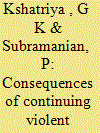

|
|
|
|
|
| Summary/Abstract |
Human beings themselves are responsible for war as the seeds of conflict are sown in their minds. When conflicts assume large proportions, the whole world gets affected by them. The situation in Iraq is beyond imagination with people’s predicament of having to face lack of food, shelter, medicines and security posing serious problems. The children in particular, who are soft targets exist in nightmarish conditions.
|
|
|
|
|
|
|
|
|
|
|
|
|
|
|
|
| 8 |
ID:
151661
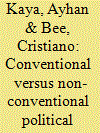

|
|
|
|
|
| Summary/Abstract |
This special issue focuses on the emergence of different forms of civic and political activism in Turkey. In doing so, we have taken into account different components of active citizenship and looked more specifically into the development of civic and political forms of activism that bridge the realms of conventional and non-conventional participation. As witnessed in many different contexts, conventional forms of political participation such as electoral politics are being replaced with non-conventional forms of participation that take place outside, and sometimes in opposition to, the more traditional channels of representation.
|
|
|
|
|
|
|
|
|
|
|
|
|
|
|
|
| 9 |
ID:
153971
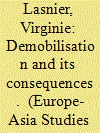

|
|
|
|
|
| Summary/Abstract |
The aftermath of the 2011–2012 Russian social movement Za chestnye vybory (For Fair Elections) challenges the common assumption that sees mass mobilisation as leading to positive outcomes for civil society. This article argues that the movement, by failing to institutionalise cooperative ties and secure popular support, had ambiguous outcomes for civil society. While repression surely played a role in this outcome, choices made by movement leaders during demobilisation should not be overlooked: one part of the movement became radicalised while another made a premature attempt to enter formal politics, thus hindering the movement’s later attempt to institutionalise.
|
|
|
|
|
|
|
|
|
|
|
|
|
|
|
|
| 10 |
ID:
140368
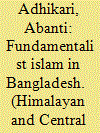

|
|
|
| 11 |
ID:
183837
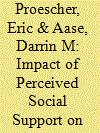

|
|
|
|
|
| Summary/Abstract |
This study examined the impact of perceived social support on mental health and psychosocial functioning in combat veterans after military deployment, including veterans with post-traumatic stress disorder (PTSD) and veterans with comorbid PTSD and alcohol use disorder. Veterans (n = 139; female = 23) completed self-report and clinician-administered measures of social support, mental and physical health, functional impairment, and quality of life. The cohort was divided into high, medium, and low perceived social support based on averages of the total score from the Multidimensional Scale of Perceived Social Support. Relative to the low perceived social support group, the high perceived social support group reported fewer symptoms of PTSD, anxiety, and depression. The high perceived social support group also reported a more diverse and embedded social network, less disability, and better quality of life. Of note, the high and low perceived social support groups did not differ on age, gender, education, race ethnicity, or combat trauma exposure. These findings highlight that perceived social support may play an important role in the treatment of postwar veterans as they transition back to civilian life.
|
|
|
|
|
|
|
|
|
|
|
|
|
|
|
|
| 12 |
ID:
140151
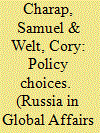

|
|
|
| 13 |
ID:
140367


|
|
|
| 14 |
ID:
154470
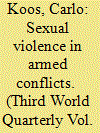

|
|
|
|
|
| Summary/Abstract |
Research on conflict-related sexual violence (CRSV) has grown rapidly over the last decade. This article consolidates existing social science research on CSRV according to two lines of inquiry: its causes and its consequences. Overall, research has considerably advanced our knowledge of the causes of CRSV, particularly in four aspects: purpose, context, individual motives and intra-group dynamics. However, there is a need to better understand the societal consequences of CRSV, in particular how it affects relations in families, and within and between communities. Overall there remains a shortage of empirical, in particular mixed-method, designs to produce research which is relevant for policymakers and practitioners.
|
|
|
|
|
|
|
|
|
|
|
|
|
|
|
|
| 15 |
ID:
139605
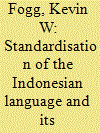

|
|
|
|
|
| Summary/Abstract |
In the 1940s and 1950s, several organs of the newly independent Indonesian state oversaw the standardisation of the Indonesian national language. In this process, Western-oriented bureaucrats pushed the language towards European normativity, significantly decreasing the influence of Arabic. While this reform carried symbolic meaning, the practical ramifications on Indonesian orthography, spelling, and word selection also carried real, non-symbolic effects on the accessibility of this language to Indonesian Islamic leaders. Standardising orthography to use the Roman alphabet rendered many Muslims illiterate in a language they had been using for decades. Choices in word selection and spelling limited the Islamic meanings that the new language could carry, thus impacting how Muslims could use the national language for religious and other purposes. Indonesian linguistic reform carried serious social and political consequences in addition to the symbolic meanings often studied.
|
|
|
|
|
|
|
|
|
|
|
|
|
|
|
|
| 16 |
ID:
157178
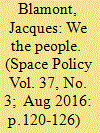

|
|
|
|
|
| Summary/Abstract |
The creation of Google Earth has initiated a new market for space imaging with hundreds of millions of potential customers. The distribution of data could replace their production as the driving factor in the development of the image business, up to the point where the managers of the flow of information would control and finance the space system, as operators do with satcoms.
|
|
|
|
|
|
|
|
|
|
|
|
|
|
|
|
|
|
|
|
|